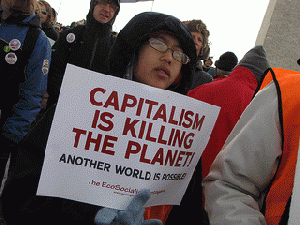Damage has been done. We see now the fullness of the iceberg, in the "decks" above and those below, and we can see the overflow of water from below, spreading to encompass whatever racial, political, social class you hail from. The water reeks of the smell of death.
Capitalism is no more the "natural" order for sustaining life than are our damaged relations with other human beings. What is "natural" in the "social reproduction of social division, hierarchy, and oppression" and the accumulation of material resources, land, and wealth for the "1%"? What is "natural" in acquiescing to an economic system that demands that human beings practice self-censorship and remain silent when others are labeled "terrorists" and "criminals"? Historically, segregation was "natural." It was "natural" for whites to insist that Blacks remain "marginal" and accept their "place" in society. Segregation was the law. The majority of the North American public refused to consider an alternative. Any alternative to segregation was seen as a nightmare that could only be stayed by the romantic notion of a free and democratic nation.
Does True Marxism Offer an Alternative?
We can begin considering an alternative to capitalism by giving ourselves permission to engage in that omitted but historically on-going conversation on Marxism.
Many Americans will continue to dismiss any discussion of Marxism outright, conjuring up flash images of governments that have distorted Marxist thought or the ideas of socialism and communism in practice. To these skeptics, let me mention remarks delivered on the subject by the economist Richard D. Wolff on September 14, 2013. (See http://rdwolff.com .) Wolff offers an excellent analogy by which to judge how objectively we may be appraising the society in which we live:
Wolff asks us to imagine that, in a family next door, one child thinks his family is just great but a second child thinks differently. If you wanted to understand this family, would you speak only to the first child, Wolff asks, the one who has a rosy view of the family, and dismiss the other child as neurotic? In order to draw your own conclusions, it would seem best to speak with both children. Yes?
Given that we know the problems many Americans face with our current capitalist economic system, is it more reasonable to continue simply to roll with its downturns, crises, and reforms, then endure more downturns, crises, and reforms--or to consider at least reading about and discussing an historical alternative to this madness?
"Capitalism," Wolff explains, produces people who, like the second child in that hypothetical family, "think about capitalism in different ways."
Forward on Climate RallyCapitalism is killing the Planet by SchuminWeb
Karl Marx Thought Differently about Capitalism
What did the thinker Marx offer as an alternative to capitalism? Did he offer in his critique of capitalism a vision of a post-capitalist society? Peter Hudis, Professor of Humanities and Philosophy, pursues this line of questioning in Marx's Concept of The Alternative to Capitalism (Haymarket Press, 2013).
Hudis's interpretation of Marx is different from any I have encountered for some time. In his book, he performs the necessary work of analyzing the whole of Marx's oeuvre, uncovering for us a vision of society that is democratic and free. As Hudis makes clear, you will be hard-pressed to find in his book the Karl Marx you expect to find, based on other studies of his work. Other studies, however, have offered only partial analyses of Marx's oeuvre, which have made it difficult "to discern whether he has a distinctive concept of a new society that addresses the realities of the twenty-first century." As Hudis shows in his own book, there is in fact a "coherent and vital concept of a new society" to be found in Marx, from his early works of the 1840s to his final writings.
From its inception, as Hudis makes clear, "the idea of socialism and communism" was not introduced to workers "from the outside" by "radical intellectuals like Marx." As a young man in the 1840s, Marx himself studied the "economic literature" available to him, including the works of "Smith, Ricardo, Say," and others. But he was also an activist, engaging directly with groups whose members were "exclusively working-class, though most were artisans and not industrial workers."
What is essential for us to understand, Hudis argues, is what is central to Marx's definition of capitalism: "the production of value and surplus value." This focus on value-production suggests that Marx, the activist-thinker, envisioned an economic system beyond capitalism. The question he posed was, How do we go beyond value-production? This question had never before been thought through and, according to Hudis, is crucial to Marx's thought, as are his projected contours of a post-capitalist future. "Marx's dialectical method cannot be fully grasped or appreciated," Hudis writes, apart from the specific vision of the future that grounded his critique of capital and capitalism."
As Hudis shows, Marx asked himself, What becomes of the human being in this production of value? His answer is that, in a modern capitalist society, you get "social relations in capitalism, wherein human relations take on the form of relations between things." In what is the "peculiar feature of capitalism," Marx discovered, "All social relations become governed by the drive to augment value, irrespective of humanity's actual needs and capacities." Furthermore, as Hudis writes, Marx recognizes that value production is not "a transhistorical feature of human existence but rather...a specific characteristic of capitalist society."
What could possibly begin to alter this unnatural and deadly foundation of human relations? Actually, the answer has deep roots in Western thought!
(Note: You can view every article as one long page if you sign up as an Advocate Member, or higher).





